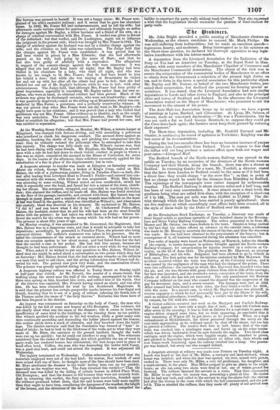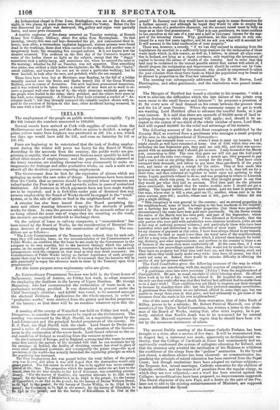Vrbt Probintts.
Mr. John Bright attended a public meeting of Manchester electors on Wednesday, as the chosen candidate to succeed Mr. Mark Philips. He WWI still suffering from indisposition; but he made an excellent speech— ingenuous, hearty, and moderate. Being interrogated as to his opinions on the Short-time question, he declared his thorough opposition to any legis- lative interference with the labour-market.
A deputation from the Liverpool Association for the Reduction of the Duty on Tea had an interview on Tuesday, at the Royal Hotel iu Man- chester, with some members of the Manchester Chamber of Commerce and the Manchester Commercial Association. The object of the visit was to secure the cooperation of the commercial bodies of Manchester in an effort to obtain from the Government a reduction of the present high duties on tea, and to form in the town a special association for this particular object. Mr. Bayley and Mr. Turner, on behalf of the two Manchester bodies, pro- mised their cooperation, but declined the proposal for forming special as sociations. It was stated, that the Liverpool Association had sent similar deputations to Leeds and other towns in England, and also to the principal cities and towns of Scotland and Ireland. In the afternoon the Liverpool Association waited on the Mayor of Manchester; who promised to aid tile; movement to the utmost of his power.
The Anti-Malt-tax Association keeps up its activity : we have reports of meetings at Lynn, Burford, and Cirencester. At Lynn, Mr. Selinos, of Sussex, made an untoward declaration—" He was a Protectionist, but he was not such a flat as Lord George Bentinck, to suppose they could get the Corn-laws back again: the farmers must keep their ground by reducing their expenses."
The Short-time deputation, including Mr. Busfeild Ferrand and Nr. Oastler, is continuing its round of agitation in Yorkshire: Keighley was the last scene of its demonstrations.
During the last two months there has been an immense increase of pauper immigration into Lancashire from Ireland. There is reason to fear that the influx will ere long produce a serious effect upon both our wages and poor-rates.—Liverpool Mail.
The Bedford branch of the North-western Railway was opened to the public on Tuesday, by an excursion of the directors of the North-western Company and their friends, along the branch; there was also a dinner at Bedford. In returning thanks for a toast, Mr. Toothill, * director, stated that the fares from London to Bedford would be the same as if it had been a direct line: they would charge "as the crow flies"; so that in point of fact no charge would be made for the distance from Bletchley to Bedford. The rejoicings of the townspeople were rather damped by unfavourable weather. The Bedford Railway is about sixteen miles and a half long, and has been of very easy construction. It runs almost upon a dead level, the gradients being what are called first-class, with the exception of a short run of 1 in 128. The cost per mile was from 16,0001. to 17,000L The dis- trict through which the line has been carried is purely agricultural : there are five stations; at which exceedingly neat offices have been erected, all In the style of those built by the Duke of Bedford over his estate.
At the Birmingham Stock Exchange, on Tuesday, a discovery was made of three forged orders to purchase upwards of three hundred shares in the Birming- ham and Stour Valley Railway. Company. The orders purported to be from Mr. Massey and Mr. Onions, two share-brokers in the town. Suspicion being excited by the fact that the orders offered an advance on the current rates, a reference was made to Mr. Massey to ascertain the reason of the rise•'and thus the discovery was made. No clue had been obtained to the perpetrators of the forgery ; but in consequence of it, all business transacted during the afternoon was cancelled.
Two writs of inquiry were heard on Wednesday, at Warwick, before the Sheriffs of the county, to assess damages in actions brought against the North-western Railway Company, for compensation for injuries received by a collision at CO ventry, on the 2d of June 184.5. The plaintiffs were Mr. Haywood, an attorney of Birmingham, and his wife. Ju.cent had been allowed to go by default in both cases. The first action was for t .e injuries sustained by Mrs. Haywood. The accident occurred whilst the train was waiting at the Coventry station, and it was caused by the negligence of the man who had the charge of the points. There were two collisions: the carriage in which Mrs. Haywood was, bounded twice into the air, and she was thrown with great violence from side to side of the carnage; her face was lacerated, and she received a severe concussion of the brain, from the effects of which she has not yet recovered. The only punishment the Railway Company inflicted on the man who caused the disaster was the suspension of ills pay for seventeen days, and a severe censure. The damages were laid at 500L After counsel had been heard on both sides, the Jury found a verdict for 8001., with 40a. costs. In a second case, in which Mr. Haywood alone was plaintiffi to recover expenses to which he had necessarily been put by the illness of his wife, such as medical attendance, travelling, &c., a verdict was taken for the pleintir, by consent, for 701. with 40*. costs.
A violent collision occurred last week on the Maryport and Carlisle Railway: The road appears to have only a single line of rails. A train left Carlisle boon after seven in the morning; it was to wait at Dalston for a coal-train to pane; the engine-driver stopped some time, but no train appearing, he concluded that it was remaining at Wigton till he got there; so he proceeded. When on a high embankment at Micklethwaite, the driver perceived through the misty air the coal-train approaching at its ordinary speed: he shut off the steam, but too late to prevent a collision. The tenders were first in both trains; that of the coal- train was crushed into a misshapen mass, and forced up on the other tender which was driven backwards from its axle towards the engine. Two third-class carriages next the engine, e, which were happily empty, were smashed to pieces, and pitched in fragments upon the embankment on either side their wheels and iron frame-work remaining upon the railway crushed into a heap. One passen- ger was bruised, but every one else escaped unhurt.
A desperate attempt at robbery was made near Preston on Tuesday night. A knock was heard at the door of Mr. Miller, a surveyor and land-steward, whose house was isolated; and when the door was opened, six men, armed with pistols, rushed in. There were only Mr. Miller, a very old gentleman, his daughter, and a maid-servant, in the place. Miss Miller escaped to give an alarm to the neigh- boors; as she ran away two shots were fired at her, one of which grazed her forehead. The robbers fastened the servant in a room. They then commanded Mr. Miller to say where his money was, presenting a pistol at him. Ile denied that he had any cash, and called to the servant to ring the alarm-bell: the thieves had shut the woman in the room with which the bell communicated, and she pul- led it. This so startled the ruffians, that they made off: plenty of aid armed soon after.
An Independent chapel in Friar Lane, Nottingham, was set on fire the other night, in two places, by some person who had robbed the Vestry. Before the fire was discovered the pulpit was destroyed, the gallery and organ were partially burnt, and some pews consumed.
A terrible explosion of fire-damp occurred on Tuesday morning, at Rounds Green New Colliery, Oldbury about five miles from Birmingham. On that morning, twenty-five men and 'boys descended the pit, and commenced their la boors; soon after, a tremendone explosion happened; sixteen persons were found dead in the workings, three died when carried to the surface, and another man is dangerously hurt; the remaining five escaped unhurt. It is not known how the disaster occurred. The evidence on the first day of the Coroner's inquest on some of the bodies threw no light on the subject, except that the doggy" sometimes took a safety-lamp, and sometimes not, when he entered the mine in the morning: whether he did on Tuesday, was not apparent. That something was amiss, was evident a little before the explosion; for Mr. Holland, the "batty," smelt sulphur, and warned his son not to enter a particular working; but he went himself, to look after the men, and perished, while the son escaped.
Three lives have been lost at Mortimer, near Reading, by the fall of a bridge recently erected over the Berks and Hants branch line of the Great Western Railway, now in course of formation. The arch had been pronounced dangerous, and it was ordered to be taken down; a number of men were set to work to re- move a parapet wall over the top of it; the whole structure suddenly gave way; the people were buried in the rums; three perished, and the others were more or less hurt, some dangerously. A Coroner's Jury have returned a verdict of " Ac- cidental death"; but they strongly censured the culpable neglect shown with re- gard to the erection of bridges on this line; other accidents having occurred, in one case with a loss of life.



























 Previous page
Previous page